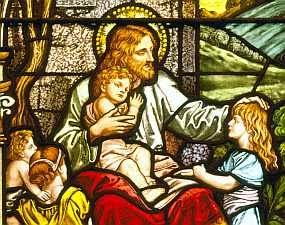As we consider the mission of the church, which is to make disciples of Jesus Christ for the transformation of the world, it's time to think about how the church make disciples. By what method or process does a church form persons into Christ-followers?
In the gospels we learn how Jesus formed disciples. He called them. He taught them, He prayed with them and for them. He ate with them. He worked in ministry together with them. He empowered them. He sent them.
In the above passage from John's gospel we witness the calling of disciples. It doesn't happen the way the other gospels portray it. Instead of Jesus calling to potential disciples, those who are curious about Jesus come to Him. John first shared his enthusiasm about Jesus with some who are following John.
“Look, here is the Lamb of God!” (Jn 1:36b)
A couple who heard John's testimony went and followed after Jesus. They asked Jesus where He was staying. Jesus replied, "Come and see." They did.
This simple meeting is loaded with meaning. "Come and see" isn't just about where Jesus was staying. It was about these men learning that the Messiah had come among them. As they followed Jesus, they soon learned that Jesus was the Christ. Even the question "Where are you staying?" is loaded. Jesus is God in the flesh. God is dwelling among His people in Jesus. God dwells among the people in the body of Christ, the church. The question, "Where are you staying?" in John 1:38, could also be read as "Where are you abiding or remaining?" The Greek word translated as "staying" is the same word used in John 15:4.
Abide in me as I abide in you. (John 15:4)
You could read it as, "Stay in me and I stay in you." The point is that Jesus dwells in the hearts of those who love Him and keep His commandments. This is what followers of Jesus do. They love Jesus because He has chosen them and loved them. He gave His life as a ransom for them, so that they might have life. They follow His teachings and commands because they long to please the One they love and worship. By doing so they become like the One they lovingly worship and follow.
The first step in any church's disciple making process is telling others about Jesus. Now if I went around today and spoke to a stranger and said, "Look, I know Jesus the Lamb of God who takes away the sin of the world," I doubt I'd get very far with that person.
Consider the context in which John tells those near him about Jesus. They were John's disciples. John had influence over them as their teacher. They had given themselves to John's authority. We too have influence. It's called relationship, friendship, and association. We all have a web of relationships through friends, relatives, associates at work or community organizations, and neighbors who live close by. Some are closer than others, but through these relationships a disciple can plan to deepen ties.
First ask God to give you ten names from your network of relationships whom He would have you pray for. List the names that come to mind and begin praying for them. Pray for them everyday for forty days and see what happens. Pray for them to come to know the saving love of God. Pray for an opportunity to share why Jesus is important to you.
Prepare yourself to do what John the Baptist did. Prepare how you will tell others about Jesus. One method is to answer three questions in brief paragraphs. Your witness should be short and concise, but from the heart. It needs to be real, based on your personal experience of Jesus. The three questions are:
- What was my life like before Jesus became my Lord and Savior?
- What happened when Jesus came into my heart?
- How has my life changed now that Jesus is my Lord?
For those who were raised in the church, the first question may be difficult. I was raised in the church. I've never known life without believing in Jesus. So I cannot easily say what life was like before Jesus became my Lord and Savior. But here's the truth. Though I trusted that God loved me and forgave my sins, I did not follow Jesus completely, nor was I living by His power through the Holy Spirit. I had felt the love of God a number of times as a child during worship, but warm fuzzies isn't discipleship. Following Jesus obediently as Lord is discipleship. That takes grace.
The first question might be restated, "What was my life like before I began to seriously follow Jesus as my Lord?"
We all go through the motions of faith. We read the bible once in a while. We pray some, at least over a meal or during worship. We might even serve on a committee or ministry through church. While these habits are helpful, an infrequent and undisciplined approach does not necessarily keep us abiding in Jesus. Our attitudes have much to do with the effectiveness of these activities. Have you ever worshiped, but your mind was somewhere else, or you wanted to be someplace other than worship? Have you ever prayed, but found your mind going over your to do list? Have you ever read your bible, but found you cannot remember what you just read? Our attentiveness fluctuates and our attitudes drive our true intentions. The heart that seeks God is the heart that will be rewarded, when we seek with our whole heart.
The other questions can also be difficult if you have not had a memorable experience of the risen Jesus. Warm feelings, overwhelming love, heat, tingling, light, buoyancy, touch, weight and wind: these are all common experiences when being filled with the Holy Spirit. But not every Christian has had such experiences. Bishop Emerson Colaw once wrote that only one of six Christians can point to a conversion experience. Five out of six report a slow dawning over time. It can be decades before faith comes into a robust fire of passion. They look back and say with a certain level of wonder, "I really do believe!"
I wonder if those reports are based on the church's lack of a clear disciple making process. I fully recognize that personality also affects one's experiences. But I will say this: Any disciple ought to be able to point to a turning point that marks conversion. By looking back we might be able to see when and where we began to change. If there's no change then, how has Jesus saved you at all?
The apostle Peter encouraged early disciples to prepare themselves to share the reason for their hope.
Do not fear what they fear, and do not be intimidated, but in your hearts sanctify Christ as Lord. Always be ready to make your defense to anyone who demands from you an accounting for the hope that is in you; yet do it with gentleness and reverence. (1st Peter 3:14b-16a)
What is your reason for hope in Christ?
Telling others is the first part of any disciple-making mission.
Are you prepared to tell someone?
.














